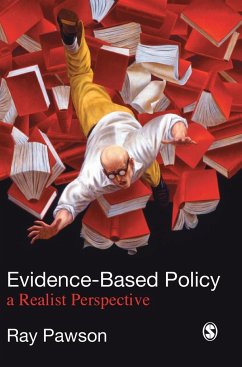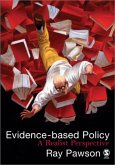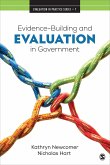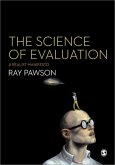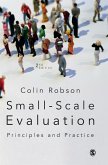In this important new book, Ray Pawson examines the recent spread of evidence-based policy making across the Western world. Few major public initiatives are mounted these days in the absence of a sustained attempt to evaluate them. Programmes are tried, tried and tried again and researched, researched and researched again. And yet it is often difficult to know which interventions, and which inquiries, will withstand the test of time. The evident solution, going by the name of evidence-based policy, is to take the longer view. Rather than relying on one-off studies, it is wiser to look to the 'weight of evidence'. Accordingly, it is now widely agreed the most useful data to support policy decisions will be culled from systematic reviews of all the existing research in particular policy domains.
This is the consensual starting point for Ray Pawson's latest foray into the world of evaluative research. But this is social science after all and harmony prevails onlyin the first chapter. Thereafter, Pawson presents a devastating critique of the dominant approach to systematic review - namely the 'meta-analytic' approach as sponsored by the Cochrane and Campbell collaborations. In its place is commended an approach that he terms 'realist synthesis'. On this vision, the real purpose of systematic review is better to understand programme theory, so that policies can be properly targeted and developed to counter an ever-changing landscape of social problems.
The book will be essential reading for all those who loved (or loathed) the arguments developed in Realistic Evaluation (Sage, 1997). It offers a complete blueprint for research synthesis, supported by detailed illustrations and worked examples from across the policy waterfront. It will be of especial interest to policy-makers, practitioners, researchers and students working in health, education, employment, social care, criminal justice, regeneration and welfare.
This is the consensual starting point for Ray Pawson's latest foray into the world of evaluative research. But this is social science after all and harmony prevails onlyin the first chapter. Thereafter, Pawson presents a devastating critique of the dominant approach to systematic review - namely the 'meta-analytic' approach as sponsored by the Cochrane and Campbell collaborations. In its place is commended an approach that he terms 'realist synthesis'. On this vision, the real purpose of systematic review is better to understand programme theory, so that policies can be properly targeted and developed to counter an ever-changing landscape of social problems.
The book will be essential reading for all those who loved (or loathed) the arguments developed in Realistic Evaluation (Sage, 1997). It offers a complete blueprint for research synthesis, supported by detailed illustrations and worked examples from across the policy waterfront. It will be of especial interest to policy-makers, practitioners, researchers and students working in health, education, employment, social care, criminal justice, regeneration and welfare.

